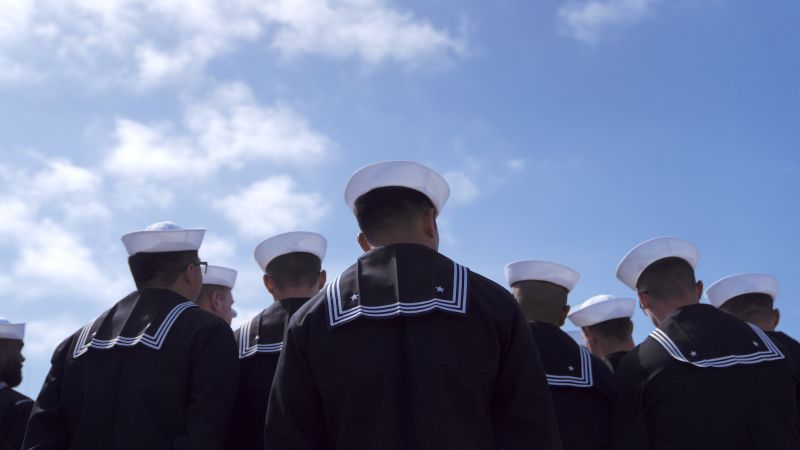US Navy Sailors Arrested for Sending Sensitive Information to Chinese Intelligence Officers
Two US Navy sailors have been indicted and arrested for allegedly sharing sensitive US military information with Chinese intelligence officers. The arrests highlight the ongoing threat posed by foreign espionage and the need for heightened security measures within the military.
Arrest of Jinchao Wei at Naval Base San Diego
Jinchao Wei, one of the arrested sailors, was apprehended as he arrived for work at Naval Base San Diego, one of the largest Navy installations in the Pacific. This arrest serves as a reminder that even within secure military bases, individuals can still pose a significant risk to national security.
Arrest of Petty Officer Wenheng Zhao at Naval Base Ventura County
Petty Officer Wenheng Zhao, the other sailor arrested, worked at Naval Base Ventura County in Port Hueneme, California. This case demonstrates the importance of thorough background checks and continuous monitoring of personnel with access to sensitive information.
Separate Indictments for Wei and Zhao
The indictment against Jinchao Wei was unsealed, revealing the extent of his alleged involvement in sharing classified information with Chinese intelligence officers. Similarly, the charges against Wenheng Zhao shed light on his role in providing sensitive military information to a person posing as a maritime economic researcher, who was actually a Chinese intelligence officer.
The Gravity of the Situation
Matt Olson, the Justice Department’s assistant attorney general for national security, emphasized the seriousness of the charges, stating that they demonstrate China’s determination to obtain critical information for their advantage. This case serves as a stark reminder of the ongoing and brazen campaign by the People’s Republic of China to target US officials with access to sensitive military secrets.
Details of the Alleged Espionage
According to prosecutors, Jinchao Wei, a machinist’s mate on the USS Essex, entered into a “handler/asset” relationship with a Chinese intelligence officer. Wei allegedly shared photos, videos, technical manuals, and mechanical layouts of Navy ships in exchange for thousands of dollars. Additionally, Wei received US citizenship during this period, further highlighting the potential risks associated with granting citizenship to individuals with access to sensitive information.
Wenheng Zhao, responsible for electrical equipment on US military installations, allegedly provided operational plans and photos of classified information to the Chinese intelligence officer. This case underscores the importance of safeguarding controlled unclassified information and reporting suspicious incidents.
The Broader Implications
These arrests come at a time when the US military is increasingly concerned about China’s strategic advancements, particularly in naval capabilities. The Chinese navy has surpassed the US Navy’s fleet size, raising concerns about the balance of power in the Indo-Pacific region.
A Strong Response
US Attorney Randy Grossman emphasized the seriousness of betraying national defense information, stating that the United States will aggressively investigate and prosecute such acts of betrayal. The military has clear policies and procedures in place to safeguard sensitive information, and efforts are underway to further tighten controls and enhance security measures.
Conclusion
The arrests of these two US Navy sailors highlight the ongoing threat of foreign espionage and the need for constant vigilance in protecting sensitive military information. The case serves as a reminder that individuals with access to classified information must prioritize their duty to country over personal gain. The United States remains committed to combating efforts by nation-state actors to steal sensitive military information and will continue to take strong action against those who betray their country.
US Navy Sailors Arrested for Sharing Sensitive Military Intel with China: What Really Happened?
In a shocking turn of events, several US Navy sailors have recently been arrested for allegedly sharing sensitive military intelligence with China. This incident has raised serious concerns about the security of classified information within the US military and has sparked a debate about the motives and actions of those involved. As the details of the case continue to unfold, it is crucial to examine the facts and understand what truly transpired.
The incident came to light when the Naval Criminal Investigative Service (NCIS) launched an investigation into a suspected espionage ring operating within the US Navy. The investigation revealed that a group of sailors had been passing classified information to a Chinese national, who was believed to be a Chinese intelligence operative. The nature of the information shared remains undisclosed, but it is reported to be related to US military capabilities and operations in the Indo-Pacific region.
The sailors involved in this case were stationed aboard the USS Nimitz aircraft carrier, one of the most advanced and powerful warships in the US Navy fleet. The fact that individuals with access to such critical information were involved in this espionage ring has raised serious questions about the effectiveness of the Navy’s security protocols and the vetting process for personnel with access to classified information.
While the investigation is ongoing, initial reports suggest that the sailors involved were motivated by financial gain. It is believed that they were enticed by promises of substantial monetary rewards in exchange for the classified information they were sharing. This raises concerns about the vulnerability of military personnel to external influences and the potential exploitation of their financial vulnerabilities.
The repercussions of this incident are far-reaching and have significant implications for US national security. The information shared could potentially compromise military operations, endanger the lives of service members, and undermine the United States’ strategic advantage in the region. It also highlights the growing threat of foreign intelligence agencies seeking to exploit vulnerabilities within the US military to gain a competitive edge.
In response to this incident, the US Navy has vowed to strengthen its security measures and review its protocols for handling classified information. This includes enhancing background checks, implementing stricter access controls, and increasing awareness and training on the risks of espionage and foreign intelligence operations. The Navy’s commitment to addressing these vulnerabilities is crucial to prevent similar incidents in the future and safeguard national security interests.
Furthermore, this incident underscores the importance of international cooperation in combating espionage and countering the activities of foreign intelligence agencies. The United States must work closely with its allies and partners to share intelligence, exchange best practices, and collectively address the evolving threats posed by state-sponsored espionage. Only through a united front can we effectively protect sensitive information and maintain a strong defense posture.
As the investigation into this case continues, it is imperative to remember that the actions of a few individuals do not reflect the integrity and professionalism of the entire US Navy. The vast majority of sailors and military personnel remain dedicated to their duty, committed to upholding the highest standards of honor, and protecting the nation’s interests. It is essential to support and recognize their unwavering commitment while holding those responsible for this breach of trust accountable.
In conclusion, the arrest of US Navy sailors for sharing sensitive military intelligence with China has raised serious concerns about the security of classified information and the motives of those involved. As the investigation unfolds, it is crucial to strengthen security measures, enhance international cooperation, and support the vast majority of dedicated service members who remain committed to protecting national security interests. By learning from this incident, the United States can fortify its defenses and ensure the safeguarding of sensitive information in the face of evolving threats.









